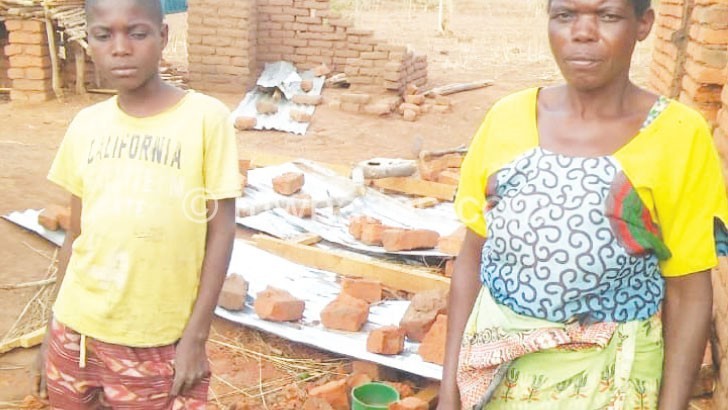Gone with the wind
For 24 hours, violent winds battered homes and blew away roofs in a vast plain on the northern part of Phalombe District.
When asked about the September 29 tempest, the locals remember the westerly winds from Mikongoni Hill was dry, hot and devastating as it swept thick clouds of dust and ripped rooftops on its way to the unknown place.
Nenenji Thuko, 40, rues the persistent storm which whirled and swirled, carrying debris, including the iron sheet roof of her home in the process.
Throughout this commotion, the woman, who lives in Khando Village, was away from home. She had gone to stay with her mother who had just delivered a baby at another village.

“All looked fine when I left home at 7pm. My 14-year-old son, Bosco Juma, was sleeping peacefully in his room. However, around 11pm, the skies became cloudy and wind started blowing slowly before it gained strength,” she recalls.
As the whirling wind caused havoc, she heard cries from all over and ran back home in the middle of the night “like a possessed person”. She was afraid that her son might be caught in the eye of the storm which was reducing homes to rubble.
“I was right. Upon arrival home, I was shocked because my house had collapsed. The roof was gone with the wind. My son was lying under a heap of bricks, crying in agony,” she narrates.
‘Life is not easy’
Thuko and her neighbours rushed Bosco to Migowi Health Centre the same night. In the morning, Bosco was referred to Holy Family Hospital where he was treated for various injuries on his chest, left arm and feet.
The boy was later joined by five other casualties crashed by crumbling walls.
According to Phalombe district commissioner Gossam Mafuta, the winds damaged 840 homes in traditional authorities Jenala, Mkhumba, Nkhulambe and Kaduya.
This means almost 5 000 people are mourning over the loss of roofs, kitchen utensils, foodstuffs and beddings, he says.
“The people are in dire need of humanitarian relief following the disaster,” said Mafuta. “Soon after assessing the damage, we alerted the Department of Disaster Management Affairs [Dodma]. They will plan on what steps to take.”
Anne Mathias, 38, from Kamwachale Village is homeless after the winds destroyed her home.
She lost cooking utensils, flour and beddings in the process.
“I am staying in my neighbour’s house with my five children,” she explains. “Without utensils, life is not easy. I have to wait for the neighbour to cook first.”
The struggle for survival continues at night.
“We have been sleeping in the cold since our blankets were blown away the day our house collapsed,” says Mathias.
During the visit to the disaster zone, scanty reconstruction was underway.
We saw people struggling to roof their homes just in time before the start of the rainy season later this month.
But they complained about the scarcity of grass in the area where most vegetation has been consumed by summer fires.
To get enough bundles, they have to go to Lake Chilwa, about 25 kilometres away.
Barnet Chikapa, 38, has started roofing his mud house.
“I have travelled to the lakeside three times in three days, taking the grass on an ox-cart,” says Chikapa.
The winds have shattered livelihoods for many households in Jenala.
The tragedy struck at a time the villagers are experiencing hunger due to drought which scorched maize in the previous growing season.
“With this disaster, we will be forced to stop looking for food to rebuild my house,” says Justin Kalepa, from Tsikulamowa Village.
He has laid a foundation for a new home following the crumbling of his house a day after the summer blow.
He has to do it fast for his five grandchildren sleeping in a safe place, says the displaced breadwinner.
Khando disaster and relief group chairperson Charles John advises affected villagers to repair the roofs before the rains start.
The rainy season begins in November, meteorologists say.
“We cannot afford to lose more houses while waiting for relief items, including roofing materials. If not roofed, the mud homes will collapse if we leave them to get soaked in rain,” he explains.
John also urges his community to plant trees to act as wind-breakers.
“Being a plain on a windward side, our area will continue experiencing such disasters in the absence of trees,” he explains.
Slow response
The locals say the response by Dodma has been slow.
Dodma spokesperson Chipiliro Khamula says government is mobilising resources in aid of the affected populations.
“Plans are at an advanced stage. Our relief package comprises one 50-kilograms bag of maize, one kg salt, 20 littre plastic buckets, two blankets, four plastic plates and five plastic cups,” he says.
Meanwhile the communities are praying for a stormy-free rainfall as we approach the rainy season. n





